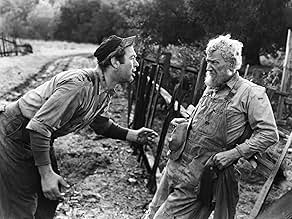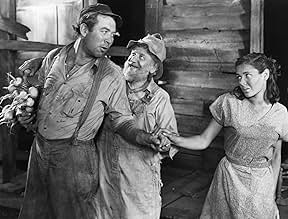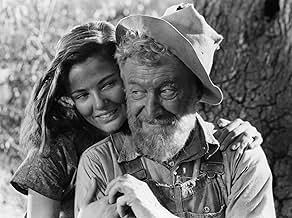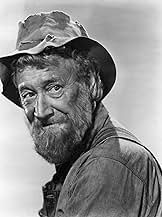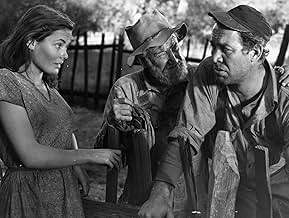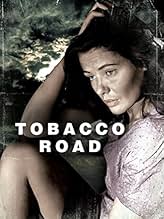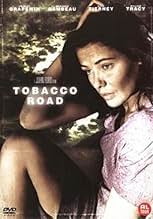IMDb RATING
6.4/10
2.7K
YOUR RATING
Hillbilly family farm life in 1941 rural Georgia.Hillbilly family farm life in 1941 rural Georgia.Hillbilly family farm life in 1941 rural Georgia.
- Director
- Writers
- Stars
- Awards
- 2 wins total
Dorothy Adams
- Payne's Secretary
- (uncredited)
- Director
- Writers
- All cast & crew
- Production, box office & more at IMDbPro
Featured reviews
Tobacco Road (1941)
** 1/2 (out of 4)
I take pride in watching bizarre movies from every country and every decade but I never figured that's what I'd be viewing when I sat down to watch this John Ford film that seems to have been forgotten over the years. The movie, based on the famous novel and long-running play, centers on Jeeter Lester (Charley Grapewin) and his family, poor Georgia farmers who are about to get kicked off their land unless they can round up $100 to stay for a year. That's pretty much all there is to know story wise, although the screenplay does take the film into different directions as the family is faced with the possibility of losing everything they love. If people got wide-eyed about the way Ford showed Indians then they're probably going to have their heads rolling off at this look at a redneck family. I was really, really caught off guard by how incredibly bizarre and strange this movie was. I think part of this is due to the comedy never working and for some strange reason this gives the film a rather bizarre atmosphere because you're watching this strange stuff yet nothing really laughing. The humor is rather strange because there's an older man (ward Bond) not wanting to marry an "old woman" of 23-years because he likes his 13-year-old current wife. We have humor about one of the Lester sons (William Tracy) who is so crazy and out of control that you can't help but think he's retarded and the film tries to get laughs off of this. We have the young Lester daughter (Gene Tierney) lusting after the older man with a lot of sexual innuendo. This redneck family is just so weird that you can't help but be slightly put off by them and the fact that the film is trying for laughs just makes some of it even stranger. The one major saving grace is the performance by Grapewin who really is marvelous here. His old-time redneck is spot on with the dialogue delivery and body movements that there's no doubt the character will ever leave your mind once you've seen it. Supporting players like Elizabeth Patterson and Dana Andrews come off pretty well but the same can't be said for Tierney who really looks bad here. She just isn't right for the role and she comes off looking like she's really struggling to do something with it. Ford's direction isn't all that bad but there's a reason this film isn't really that well-known or talked about when people discuss his work.
** 1/2 (out of 4)
I take pride in watching bizarre movies from every country and every decade but I never figured that's what I'd be viewing when I sat down to watch this John Ford film that seems to have been forgotten over the years. The movie, based on the famous novel and long-running play, centers on Jeeter Lester (Charley Grapewin) and his family, poor Georgia farmers who are about to get kicked off their land unless they can round up $100 to stay for a year. That's pretty much all there is to know story wise, although the screenplay does take the film into different directions as the family is faced with the possibility of losing everything they love. If people got wide-eyed about the way Ford showed Indians then they're probably going to have their heads rolling off at this look at a redneck family. I was really, really caught off guard by how incredibly bizarre and strange this movie was. I think part of this is due to the comedy never working and for some strange reason this gives the film a rather bizarre atmosphere because you're watching this strange stuff yet nothing really laughing. The humor is rather strange because there's an older man (ward Bond) not wanting to marry an "old woman" of 23-years because he likes his 13-year-old current wife. We have humor about one of the Lester sons (William Tracy) who is so crazy and out of control that you can't help but think he's retarded and the film tries to get laughs off of this. We have the young Lester daughter (Gene Tierney) lusting after the older man with a lot of sexual innuendo. This redneck family is just so weird that you can't help but be slightly put off by them and the fact that the film is trying for laughs just makes some of it even stranger. The one major saving grace is the performance by Grapewin who really is marvelous here. His old-time redneck is spot on with the dialogue delivery and body movements that there's no doubt the character will ever leave your mind once you've seen it. Supporting players like Elizabeth Patterson and Dana Andrews come off pretty well but the same can't be said for Tierney who really looks bad here. She just isn't right for the role and she comes off looking like she's really struggling to do something with it. Ford's direction isn't all that bad but there's a reason this film isn't really that well-known or talked about when people discuss his work.
The movie's essentially, a one-man showcase: Charlie Grapewin as the amiable n'er-do-well Jeeter Lester. He's a hoot and a half in his ragged overalls and bewhiskered face. Too bad the old coot just can't seem to get anything done, despite his uncomplaining, loyal wife (Patterson). Rarely did old Hollywood uglify settings as thoroughly as here. Lesters' shack looks like a wood pile, while others along the Road share that skid-row appearance. Trouble is that when you think about it, there's nothing funny about these miserable background conditions. Fortunately for the movie, Jeeter's comical antics distract from that troubling aspect. For example, I love the way the loose porch board keeps getting even with Jeeter's uncaring neglect in fixing it.
Yup, the Depression Era makes things especially tough for these Southern farmers, and the question the Lesters confront is whether they can get a loan before getting herded into the poor farm. Note too, how the sleek Captain Tim (Andrews) appears to represent a landlord class, while Jeeter is among his tenant farmers dependent on the upper class for support. At this point in the movie, however, all have fallen on hard times, though the Captain still looks spiffy and well-upholstered, unlike his tenants.
Nonetheless, the results are played for laughs, though I suspect many folks find the rural Southern caricatures more offensive than funny. For example, did they have to make young Dude Lester so dislikable-- that slug an angry Loy (Bond) puts on him was long overdue. Also, remind me not to loan my car to the Destruction Derby kid anytime, ever. Anyway, the movie is a sing-along for frog throats like me what with all those great old time gospel songs, even if choirmaster Sister Bessie (Rambeau) is caricatured. But please, get me a ticket to that old Road where I can maybe meet up with the luscious Ellie May (Tierney). I guess my biggest gripe is that Tierney doesn't get more screentime-- maybe all of it. On the other hand, I've definitely reached a new appreciation of the lowly turnip, of all things.
All in all, I suspect the TCF production does not wear well for many. Still and all, Grapewin delivers a rollicking performance, so give the 84-minutes a try if you haven't already.
Yup, the Depression Era makes things especially tough for these Southern farmers, and the question the Lesters confront is whether they can get a loan before getting herded into the poor farm. Note too, how the sleek Captain Tim (Andrews) appears to represent a landlord class, while Jeeter is among his tenant farmers dependent on the upper class for support. At this point in the movie, however, all have fallen on hard times, though the Captain still looks spiffy and well-upholstered, unlike his tenants.
Nonetheless, the results are played for laughs, though I suspect many folks find the rural Southern caricatures more offensive than funny. For example, did they have to make young Dude Lester so dislikable-- that slug an angry Loy (Bond) puts on him was long overdue. Also, remind me not to loan my car to the Destruction Derby kid anytime, ever. Anyway, the movie is a sing-along for frog throats like me what with all those great old time gospel songs, even if choirmaster Sister Bessie (Rambeau) is caricatured. But please, get me a ticket to that old Road where I can maybe meet up with the luscious Ellie May (Tierney). I guess my biggest gripe is that Tierney doesn't get more screentime-- maybe all of it. On the other hand, I've definitely reached a new appreciation of the lowly turnip, of all things.
All in all, I suspect the TCF production does not wear well for many. Still and all, Grapewin delivers a rollicking performance, so give the 84-minutes a try if you haven't already.
After a bank purchases the land, a family of hillbillies faces eviction if it can't come up with the rent. Based on a Caldwell novel that in turn became a stage play, this is very broad comedy that rarely rises above the level of The Three Stooges. Grapewin plays a lazy farmer who has so many children that he and his wife can't keep track of them. Tracy is horribly over-the-top as one of the grown children living at home. Tierney is third billed as Tracy's useless sister but barely has a line of dialog. Rambeau does OK as a neighbor. Andrews plays the only character who has some dignity. Every once in a while Ford came up with a real clunker, and this is one of them.
When John Ford filmed "Tobacco Road" in 1941 the play was still running on Broadway. It opened in 1933 and even today only "Life with Father" has had a longer run for a non-musical production. It was based on Erskine Caldwell's risque novel about dirt-poor Southern farmers and after his success with "The Grapes of Wrath" Ford might have seemed like a fairly obvious choice for the film version but Caldwell was not Steinbeck and this was no "Grapes of Wrath".
It's tolerable enough but Charley Grapewin's old codger Jeeter, a supporting character now given centre screen, gets on your nerves very quickly. In fact, everyone in this picture gets on your nerves very quickly, (they are all portrayed as greedy imbeciles). William Tracy is terrible as the son and a youthful Gene Tierney, (it was only her second film), is totally miscast as sex-pot Ellie May. If Marjorie Rambeau is a little less grating as Sister Bessie it's perhaps because she, at least, is trying to underplay her part and only the great Elizabeth Patterson comes out of this with any dignity. In other words, it's certainly nobody's finest hour, (except perhaps cinematographer Arthur Miller), and Ford's least of all. The only real surprise about it is how it was ever a hit in the first place.
It's tolerable enough but Charley Grapewin's old codger Jeeter, a supporting character now given centre screen, gets on your nerves very quickly. In fact, everyone in this picture gets on your nerves very quickly, (they are all portrayed as greedy imbeciles). William Tracy is terrible as the son and a youthful Gene Tierney, (it was only her second film), is totally miscast as sex-pot Ellie May. If Marjorie Rambeau is a little less grating as Sister Bessie it's perhaps because she, at least, is trying to underplay her part and only the great Elizabeth Patterson comes out of this with any dignity. In other words, it's certainly nobody's finest hour, (except perhaps cinematographer Arthur Miller), and Ford's least of all. The only real surprise about it is how it was ever a hit in the first place.
John Ford directed this adaptation of a hit play about a family of dirt poor toothless Southern farmers. Charley Grapewin is great and carries the film on his shoulders. Elizabeth Patterson gives an enjoyable (and sometimes sensitive) turn as his wife. William Tracy plays a savage character who grates on the nerves but he does a good job at it. Ward Bond is funny as a neighbor married to one of their daughters. He has the movie's most crowd-pleasing scene when he puts Tracy in his place. Dana Andrews and Gene Tierney have small roles. I think Tierney spoke less than twenty words the whole film.
Any comparison between this film and Ford's classic from the year before, Grapes of Wrath, is absurd. Beyond the very superficial similarities, they are nothing alike. This doesn't have the gravitas or artistry of that film. The closest it comes is the scene when Grapewin and Patterson talk about two of their children who left home and never returned. The rest is a grotesque comedy about people that are almost cartoon characters more than humans.
Obviously not for the easily offended among us. This film peddles in just about every Southern stereotype you can think of. Having grown up in the South with relatives not too far removed from the types of characters displayed in this, I'm not really bothered by it. Stereotypes generally have some basis in truth, no matter how much we don't want to admit it. Amusing at times, moving once or twice, but not the masterpiece it wants to be. See it for Grapewin's energetic performance if nothing else.
Any comparison between this film and Ford's classic from the year before, Grapes of Wrath, is absurd. Beyond the very superficial similarities, they are nothing alike. This doesn't have the gravitas or artistry of that film. The closest it comes is the scene when Grapewin and Patterson talk about two of their children who left home and never returned. The rest is a grotesque comedy about people that are almost cartoon characters more than humans.
Obviously not for the easily offended among us. This film peddles in just about every Southern stereotype you can think of. Having grown up in the South with relatives not too far removed from the types of characters displayed in this, I'm not really bothered by it. Stereotypes generally have some basis in truth, no matter how much we don't want to admit it. Amusing at times, moving once or twice, but not the masterpiece it wants to be. See it for Grapewin's energetic performance if nothing else.
Did you know
- TriviaWalter Brennan turned down the lead role because he disapproved of the character's laziness.
- GoofsWhen the new car is tipped over, after being driven on dirt roads and through mud, the underside is spotless.
- Crazy creditsOpening and some of the closing credits are presented written in real sand.
- ConnectionsReferenced in Madame veut un bébé (1942)
- SoundtracksDixie's Land
(uncredited)
Written by Daniel Decatur Emmett
[Variations often played as background music]
- How long is Tobacco Road?Powered by Alexa
Details
- Release date
- Country of origin
- Language
- Also known as
- Tobacco Road
- Filming locations
- Encino, Los Angeles, California, USA(poor farm sequence)
- Production company
- See more company credits at IMDbPro
Box office
- Gross worldwide
- $534
- Runtime1 hour 24 minutes
- Color
- Aspect ratio
- 1.37 : 1
Contribute to this page
Suggest an edit or add missing content

